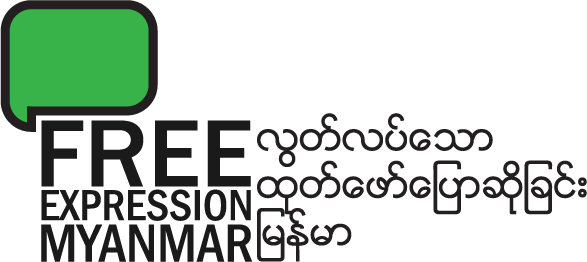Report: Defamation? International standards and Myanmar’s legal framework — အသရေဖျက်ခြင်းဆိုတာ ဘာလဲ: နိုင်ငံတကာစံနှုန်းများနှင့် မြန်မာနိုင်ငံ၏ ဥပဒေမူဘောင်
Download the full report Defamation? International standards and Myanmar's legal framework »
Myanmar is not the first country to start a transition to democracy. It follows many others, most of which have found that reforming defamation laws was a critical first step to democracy. Without reform, public debate, which democracies rely on, cannot be open and free.
Countries in transition to democracy need a goal to aim for, which is international standards. International standards on defamation are the balancing act between the right to freedom of expression and the right to a reputation. The balance has been examined in detail by a variety of international bodies and tested extensively by international courts for many years. As a result, international standards on defamation are comprehensive.
This report has described each of the most authoritative international standards on defamation. Unfortunately, Myanmar’s legal framework and its implementation fall far short of these international standards. Myanmar’s laws and courts do not support even the most basic standards required for even the newest aspiring democracy.
However, Myanmar is at the beginning of its transition – which is an excellent opportunity for the government to lay out its plans for the coming years.
The report includes:
- Introduction
- Methodology
- Defamation and freedom of expression
- Defamation is not…
- Freedom of expression
- Freedom of expression in Myanmar
- International standards on defamation
- International standards on definition
- International standards on scope
- International standards on defences
- International standards on criminal sanctions
- International standards on civil remedies
- International standards on related procedures
- Defamation law in Myanmar
- Conformity to basic international standards
- Myanmar’s defamation laws in practice
- Conclusion
- Recommendations
အသရေဖျက်ခြင်းဆိုတာ ဘာလဲ : နိုင်ငံတကာစံနှုန်းများနှင့် မြန်မာနိုင်ငံ၏ ဥပဒေမူဘောင် »
မြန်မာနိုင်ငံသည် ဒီမိုကရေစီကို စတင်ပြောင်းလဲသည့် ပထမဆုံးသော နိုင်ငံမဟုတ်ပေ။ အခြားသောနိုင်ငံများစွာပြောင်းလဲပြီးသည့်နောက်သို့ လိုက်ပါခြင်းဖြစ်ပြီး၊ အသရေဖျက်ခြင်းဥပဒေများကို ပြောင်းလဲခြင်းက ဒီမိုကရေစီ၏ အရေးအပါဆုံးသော ပထမခြေလှမ်းအဖြစ် ပြောင်းလဲပြီး သည့် နိုင်ငံအများစုတွင် တွေ့ရှိနိုင်သည်။ အပြောင်းအလဲမရှိဘဲနှင့် ဒီမို ကရေစီမှီတည်နေရသည့် အများပြည်သူ့ဆွေးနွေးငြင်းခုန်မှုကို ပွင့်လင်း လွတ်လပ်စွာ မပြုလုပ်နိုင်ပေ။
ဒီမိုကရေစီသို့ပြောင်းလဲနေသည့်နိုင်ငံများသည် ရည်မှန်းချက်ထားရှိရန် ပန်းတိုင်တစ်ခုလိုအပ်ပြီး၊ ယင်းမှာ နိုင်ငံတကာစံနှုန်းများပင် ဖြစ်သည်။ အသရေဖျက်မှုဆိုင်ရာ နိုင်ငံတကာစံနှုန်းများမှာ လွတ်လပ်စွာရေးသား ထုတ်ဖော် ပြောဆိုခွင့်နှင့် ဂုဏ်သိက္ခာ အခွင့်အရေးအကြား ချိန်ညှိ ဆောင်ရွက်ခြင်း ဖြစ်သည်။ ယင်းချိန်ညှိဆောင်ရွက်ချက်များကို နိုင်ငံ တကာအဖွဲ့အစည်းများစွာတွင် အသေးစိတ်စူးစမ်း လေ့လာခဲ့ပြီးဖြစ်သ လို၊ နိုင်ငံတကာတရားရုံးများတွင် နှစ်ပေါင်းများစွာကတည်းက အထူး ကြပ်မတ် စမ်းသပ်အသုံးချခဲ့ပြီးလည်း ဖြစ်သည်။ ရလဒ်အနေဖြင့် အ သရေဖျက်မှုဆိုင်ရာ နိုင်ငံတကာစံနှုန်းများသည် အများပါဝင် စည်း နှောင်မှုရှိပြီး ဖြစ်လေသည်။
ယခုအစီရင်ခံစာမှာ အသရေဖျက်ခြင်းဆိုင်ရာ အခိုင်မာဆုံးသော နိုင်ငံ တကာစံနှုန်းများကို တစ်ခုချင်းစီဖော်ပြထားပြီး ဖြစ်သည်။ ကံမကောင်း စွာပင် မြန်မာနိုင်ငံ၏ ဥပဒေမူဘောင်နှင့် ဥပဒေအသုံးပြုမှုများတွင် နိုင်ငံ တကာစံနှုန်းများ လစ်ဟာနေပါသည်။ ယုတ်စွအဆုံး တက်သစ်စဒီမိုက ရေစီအတွက် အခြေခံအကျ ဆုံးဖြစ်သော စံနှုန်းများကိုပင်လျှင် မြန်မာ နိုင်ငံဥပဒေနှင့် တရားရုံးများက ထောက်ခံပံ့ပိုးထားခြင်းမရှိပါ။
သို့သော်လည်း မြန်မာနိုင်ငံသည် ဒီမိုကရေစီအသွင်ကူးပြောင်းစ နိုင်ငံ ဖြစ်သည်နှင့်အညီ နောင်လာမည့်နှစ်များစွာအတွက် အစိုးရမှ အစီအ စဉ်များချမှတ်အကောင်ထည်ဖော်ရန် အင်မတန်ကောင်းမွန်သော အ ခွင့်အရေးလည်းရှိလေသည်။
- နိဒါန်း
- အသရေဖျက်ခြင်းနှင့် လွတ်လပ်စွာထုတ်ဖော်ရေးသားပြောဆိုခြင်း
- အသရေဖျက်ခြင်းဆိုင်ရာနိုင်ငံတကာစံနှုန်းများ
- မြန်မာနိုင်ငံရှိ အသရေဖျက်မှု ဥပဒေ
- နိဂုံး
အသေရဖ်က္ျခင္းဆိုတာ ဘာလဲ : နိုင္ငံတကာစံႏႈန္းမ်ားႏွင့္ ျမန္မာနိုင္ငံ၏ ဥပေဒမူေဘာင္
ျမန္မာနိုင္ငံသည္ ဒီမိုကေရစီကို စတင္ေျပာင္းလဲသည့္ ပထမဆံုးေသာ နိုင္ငံမဟုတ္ေပ။ အျခားေသာနိုင္ငံမ်ားစြာေျပာင္းလဲျပီးသည့္ေနာက္သို႔ လိုက္ပါျခင္းျဖစ္ျပီး၊ အသေရဖ်က္ျခင္းဥပေဒမ်ားကို ေျပာင္းလဲျခင္းက ဒီမိုကေရစီ၏ အေရးအပါဆံုးေသာ ပထမေျခလွမ္းအျဖစ္ ေျပာင္းလဲျပီး သည့္ နိုင္ငံအမ်ားစုတြင္ ေတြ႕ရွိနိုင္သည္။ အေျပာင္းအလဲမရွိဘဲႏွင့္ ဒီမို ကေရစီမွီတည္ေနရသည့္ အမ်ားျပည္သူ႔ေဆြးေႏြးျငင္းခုန္မႈကို ပြင့္လင္း လြတ္လပ္စြာ မျပဳလုပ္နိုင္ေပ။
ဒီမိုကေရစီသို႔ေျပာင္းလဲေနသည့္နိုင္ငံမ်ားသည္ ရည္မွန္းခ်က္ထားရွိရန္ ပန္းတိုင္တစ္ခုလိုအပ္ျပီး၊ ယင္းမွာ နိုင္ငံတကာစံႏႈန္းမ်ားပင္ ျဖစ္သည္။ အသေရဖ်က္မႈဆိုင္ရာ နိုင္ငံတကာစံႏႈန္းမ်ားမွာ လြတ္လပ္စြာေရးသား ထုတ္ေဖာ္ ေျပာဆိုခြင့္ႏွင့္ ဂုဏ္သိကၡာ အခြင့္အေရးအၾကား ခ်ိန္ညိွ ေဆာင္ရြက္ျခင္း ျဖစ္သည္။ ယင္းခ်ိန္ညိွေဆာင္ရြက္ခ်က္မ်ားကို နိုင္ငံ တကာအဖြဲ႔အစည္းမ်ားစြာတြင္ အေသးစိတ္စူးစမ္း ေလ့လာခဲ့ျပီးျဖစ္သ လို၊ နိုင္ငံတကာတရားရံုးမ်ားတြင္ ႏွစ္ေပါင္းမ်ားစြာကတည္းက အထူး ၾကပ္မတ္ စမ္းသပ္အသံုးခ်ခဲ့ျပီးလည္း ျဖစ္သည္။ ရလဒ္အေနျဖင့္ အ သေရဖ်က္မႈဆိုင္ရာ နိုင္ငံတကာစံႏႈန္းမ်ားသည္ အမ်ားပါဝင္ စည္း ေႏွာင္မႈရွိျပီး ျဖစ္ေလသည္။
ယခုအစီရင္ခံစာမွာ အသေရဖ်က္ျခင္းဆိုင္ရာ အခိုင္မာဆံုးေသာ နုိင္ငံ တကာစံႏႈန္းမ်ားကို တစ္ခုခ်င္းစီေဖာ္ျပထားျပီး ျဖစ္သည္။ ကံမေကာင္း စြာပင္ ျမန္မာနို္င္ငံ၏ ဥပေဒမူေဘာင္ႏွင့္ ဥပေဒအသံုးျပဳမႈမ်ားတြင္ နိုင္ငံ တကာစံႏႈန္းမ်ား လစ္ဟာေနပါသည္။ ယုတ္စြအဆံုး တက္သစ္စဒီမိုက ေရစီအတြက္ အေျခခံအက် ဆံုးျဖစ္ေသာ စံႏႈန္းမ်ားကိုပင္လွ်င္ ျမန္မာ နို္င္ငံဥပေဒႏွင့္ တရားရံုးမ်ားက ေထာက္ခံပံ့ပိုးထားျခင္းမရွိပါ။
သို႔ေသာ္လည္း ျမန္မာနိုင္ငံသည္ ဒီမိုကေရစီအသြင္ကူးေျပာင္းစ နုိင္ငံ ျဖစ္သည္ႏွင့္အညီ ေနာင္လာမည့္ႏွစ္မ်ားစြာအတြက္ အစိုးရမွ အစီအ စဥ္မ်ားခ်မွတ္အေကာင္ထည္ေဖာ္ရန္ အင္မတန္ေကာင္းမြန္ေသာ အ ခြင့္အေရးလည္းရွိေလသည္။




